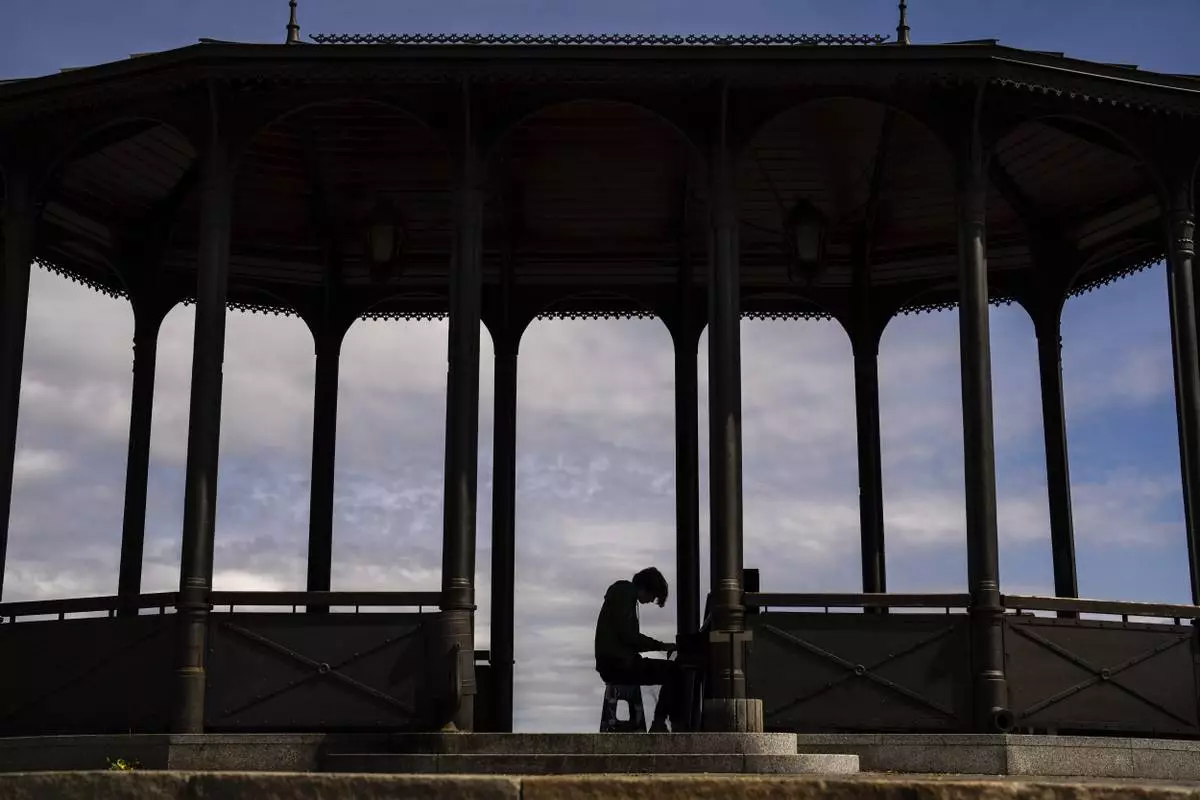Meeting on the campus of Jackson State University on a recent Friday afternoon, dozens of black women came together to strategize about the upcoming midterm elections, opening the gathering with a freedom song.
"The revolution done signed my name," they moaned, invoking the names of the ancestors whose strength has willed them to persevere: Harriet Tubman. Shirley Chisholm. Aretha Franklin. Two were like them, daughters of Mississippi: Ella Jo Baker. Fannie Lou Hamer.
"All of us who are in the room right now are midwives for transformation," said Rukia Lumumba, daughter of the late Jackson Mayor Chokwe Lumumba, and co-founder of the Electoral Justice Project.
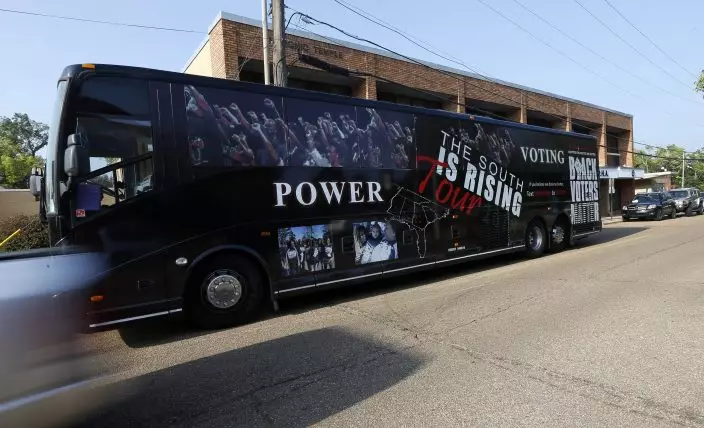
In this Aug. 24, 2018 photo, a truck passes a decorated Black Voters Matter Fund tour bus at a Jackson, Miss., stop where the field team and members of a number of women led Mississippi grassroots political organizations, met to discuss interest and excitement for the upcoming election, documenting the campaigning in locales with important upcoming races where black turnout will be key and exposing traveling national media to their work. (AP PhotoRogelio V. Solis)
The impact of such targeted work is evident. Black women went to the polls in record numbers last December to elect Doug Jones as the first Democratic senator from Alabama in 25 years. As of this week, 39 black women are nominees for the U.S. House in the November midterms, including 22 women who aren't incumbents.
The meeting soon shifted to strategy as the women plotted how to harness the energy of black female voters this fall. Scenes like these are playing out across the country as black women convene at schools, churches and homes to plan how to make sure that black voters — particularly women — are aware of the upcoming elections, registered and planning to vote and that their family members will do the same.
It's all part of an effort to reshape the politics of the Trump era when many black voters feel threatened by the country's increasingly racially polarized climate, with concerns ranging from access to the ballot box to the president's hostility to protesting NFL players and the violent demonstrations last summer in Charlottesville, Virginia.
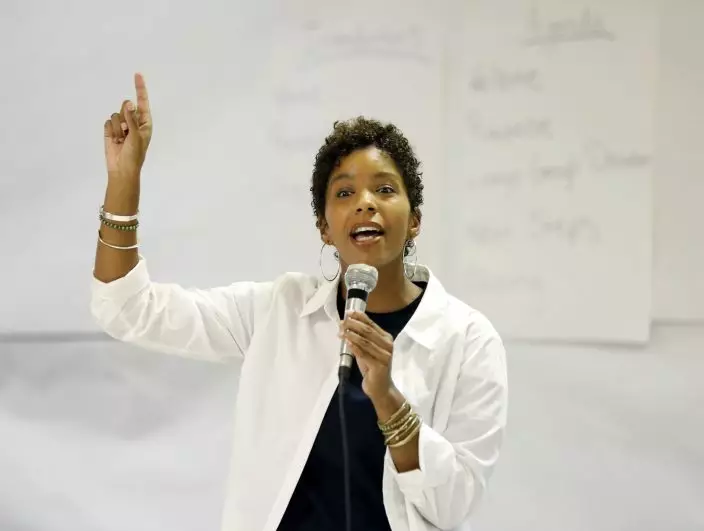
In this Aug. 24, 2018 photo, Rukia Lumumba of the People's Advocacy Institute and Malcolm X Grassroots Movement, leads a discussion at the Black Women Matter Issues Forum of small political rural and urban organizations and the Black Voters Matter Fund field team in a leadership exercise in Jackson, Miss. The meeting was in part to introduce national media to these hands-on organizations that work throughout the state and also to build interest and excitement among the groups, that are mainly women led, for the upcoming election, defining issues and the campaigning in locales where black turnout might be key. (AP PhotoRogelio V. Solis)
In California, volunteers spent last weekend working at phone banks and texting for Ayanna Pressley, whose upset victory Tuesday put her on track to become Massachusetts' first black female congresswoman. Others have started political action committees to provide financial resources to candidates such as Stacey Abrams, the Democratic nominee for governor in Georgia. If she wins in November, Abrams would become the first black female governor elected to lead a U.S. state.
The Mississippi gathering was part of a stop on a tour across the Deep South organized by LaTosha Brown, co-founder of the Black Voters Matter Fund, which aims to increase political power in black communities.
Brown said the time is now for black women to lead again. She pointed to incidents like the attempt to close a majority of polling places in Randolph County, Georgia, last month, as proof of the need for the kind of continued vigilance black women have long provided.
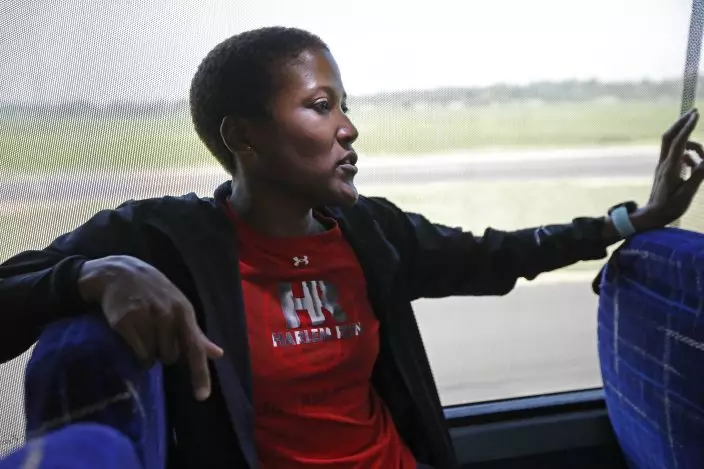
In this Aug. 24, 2018 photo, Alison Desir, with Harlem Run, Run 4 All Women, a collective of runners passionate about running, health, social welfare, women's rights and community involvement, listens as speakers describe their grassroots political programs aboard a Black Voters Matter Fund bus tour in the Mississippi Delta, near Greenville. The tour was in part to introduce traveling national media to a number of hands-on organizations, mainly led by women, that are working throughout the Delta to build interest and excitement for the upcoming election, documenting the campaigning in locales with important upcoming races where black turnout might be key. (AP PhotoRogelio V. Solis)
"This is what we do," she said. "We want to take it to another level. We see what's happening in this country. . We know how to fight, we know how to win, we know how to transform, we know how to build power. We have everything we need."
Headed into November, black female organizers are hoping to elect more African-Americans to power and not simply be a reliable voting block for white Democrats.
In Alabama, "black women were looked to, to bail out Democrats and the state from a very problematic candidate," said Glynda Carr, co-founder of Higher Heights for America, which focuses on electing black women and galvanizing them as voters. "Alabama was this tipping point around black women's leadership, when we woke up to our Twitter feed going crazy. The broader community recognized black women are the building blocks to a winning coalition."
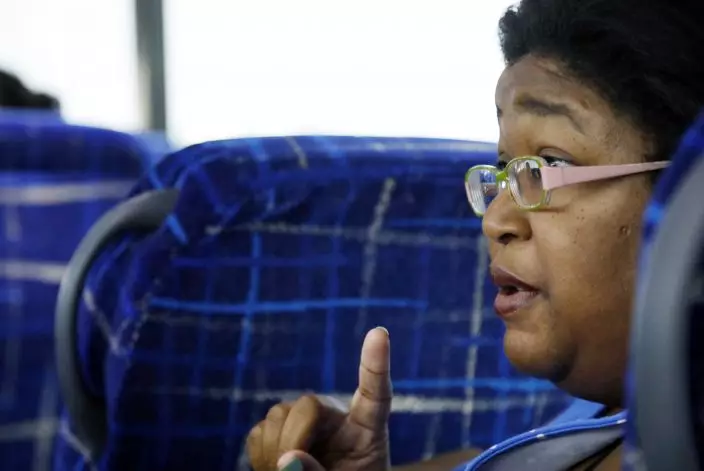
In this Aug. 24, 2018 photo, Kenya Collins, speaks about hands-on grassroots efforts to mobilize African-American voters in Mississippi, as she travels on a Black Voters Matter bus tour in Cleveland, Miss. As the Black Voters Matter Fund tour rolled through Mississippi, Collins and Cassandra Overton Welchlin chatted easily in their seats, each tooting the other’s horn and finishing the other’s sentences. Because there are so few black women on the ground, Collins explained, they have no choice but to stick together. (AP PhotoRogelio V. Solis)
Rhonda Briggins has long worked in politics but never considered herself "a money person" until this year. Briggins co-founded R.O.S.E.-PAC, short for Raising Our Sisters' Electability, and started the Sisters Supporting Sisters campaign this summer, with the goal of getting 100 women at a time to donate $100 each.
Her pitch is simple: When black women go to the hair salon, she asks them to talk to other women about the midterms and about the importance of voting.
Along the Black Voters Matter Fund tour, Briggins told a crowd of black women organizers in Stockbridge, Georgia, "This is not a time for us to play."
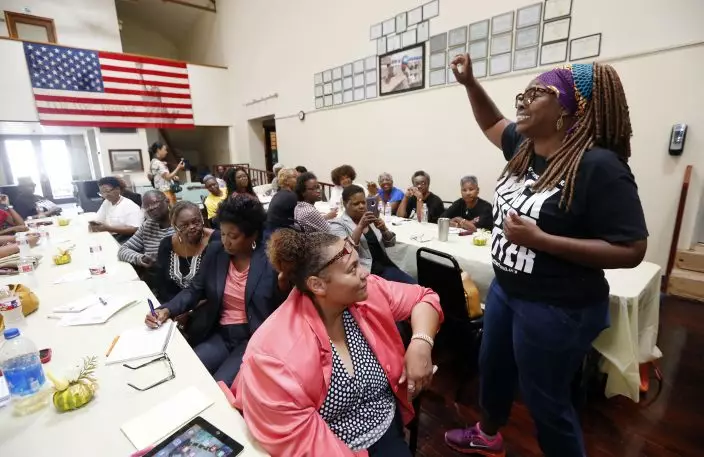
In this Aug. 24, 2018 photograph, LaTosha Brown, right, co-founder of Black Voters Matter, breaks out with an organizing song at a meeting of several Mississippi grassroots organizations at MACE, Mississippi Action for Community Education, headquarters in Greenville, Miss. Brown said the time is now for black women to lead again. She pointed to incidents like the attempt to close a majority of polling places in Randolph County, Ga., in August, as proof of the need for the kind of continued vigilance black women have long provided. (AP PhotoRogelio V. Solis)
"So many times we have good sisters on the ballot and they don't have the resources," she said. "We've come together . we need people to educate everyone. We're just trying to find grassroots ways to organize African-American women. We have been always behind the scenes."
Fallon McClure, who was sitting in the audience, agreed.
"For the longest time, there's been a lot of white-led organizations, and there'd be a sprinkling of women of color, but now it's starting to be women of color-led organizations," said McClure, state director for Spread the Vote, started by a black woman, which is working in states with voter ID laws to get free identification cards.
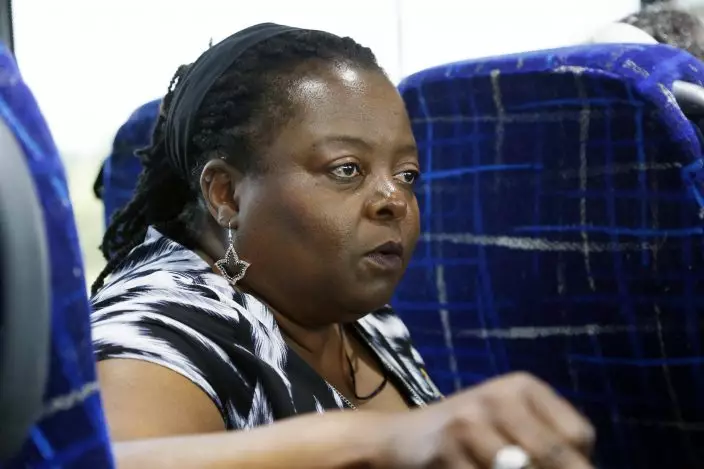
In this Aug. 24, 2018 photo, Mable Spears-Starks, President and CEO of MACE, Mississippi Action for Community Education, outlines what her non-profit, minority rural development organization has developed in the Delta over several decades, while riding a bus towards Greenville, Miss. MACE was one of several Mississippi grassroots organizations that rode with the Black Voters Matter Fund field team to the Delta, to build interest and excitement for the upcoming election, documenting the campaigning in locales with important upcoming races where black turnout might be key. (AP PhotoRogelio V. Solis)
"Even in organizations that are still white-led, we're seeing their whole organizing crew is starting to be black women and other women of color," she continued. "They've been doing the work for a long time but weren't necessarily getting the credit, or they had a regular, full-time job, and they were just kind of doing the work on the side because they cared about their community and wanted to make a difference, but now they're getting the recognition for it."
Black women are also collaborating across states and across the country to maximize their efforts. Many have worked together on previous campaigns or on other grassroots projects in black communities, bringing a familiarity to the work they now share.
As the Black Voters Matter Fund tour rolled through Mississippi, Kenya Collins and Cassandra Overton Welchlin chatted easily in their seats, each tooting the other's horn and finishing the other's sentences. Because there are so few black women on the ground, Collins explained, they have no choice but to stick together.
"In Mississippi, black women have always been about community," said Overton Welchlin, co-convener of the Mississippi Black Women's Roundtable. "If we can shift the power to get black women to show up for every election, we can do some amazing things. The Bible says that in the multitude of counselors, plans succeed."
For nearly two hours after the bus rolled into Jackson for the final meeting of the day, Brown listened to her sisters in the struggle discussing their work around issues from education to nutrition to reproductive rights. When it was her turn to speak, she ended her remarks by echoing Baker's most famous line with a renewed urgency:
"We who believe in freedom cannot rest until it comes."
Whack is The Associated Press' national writer on race and ethnicity. Follow her on Twitter at http://www.twitter.com/emarvelous.



